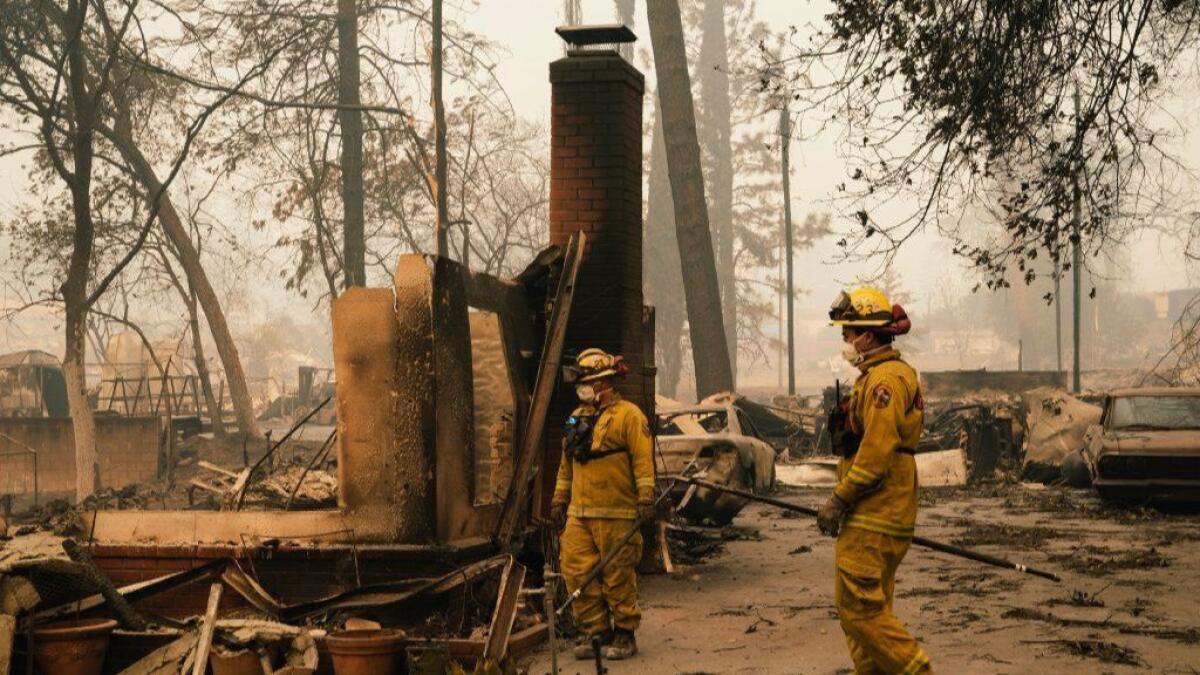Insurer Merced went belly up after Camp fire. Here’s what policyholders need to know

- Share via
California regulators have taken over Merced Property & Casualty, an insurance company bankrupted by insurance claims from the Camp fire.
The small San Joaquin Valley insurer had assets of about $23 million, but expected it might have to pay out as much as $64 million in claims for properties in Paradise, the Butte County town where fire destroyed thousands of homes.
A judge on Monday gave California Insurance Commissioner Dave Jones permission to seize and liquidate the company’s assets. Now, the company is in the process of handing over policy and customer information to the California Insurance Guarantee Assn., or CIGA, which processes and pays claims on behalf of insolvent insurers.
Merced’s insolvency has big ramifications for customers, particularly victims of the Camp fire. Here’s what policyholders should know:
If my home was damaged or destroyed and I have already filed a claim with Merced, what do I need to do?
Claims already filed will be transferred to the CIGA. Wayne Wilson, CIGA’s executive director, said he expects to start processing claims Monday. This is the first time in decades that CIGA has had to step in to cover claims for a property insurer.
What if I haven’t filed a claim yet?
File your claim with CIGA, not with Merced. Here’s CIGA’s contact information:
- Phone: (818) 844-4300
- Email: assistance@caiga.org
- Mail: California Insurance Guarantee Association, P.O. Box 29066, Glendale, CA 91209-9066
Claims must be filed by Jan. 2. After that, all Merced policies will expire. Merced policyholders can find more information on CIGA’s website: www.caiga.org.
Will my insurance claim be paid in full?
Wilson said the association will cover most claims, but payouts are capped at $500,000 per claim. That limit applies separately to claims for damage to the structure of a home, damage to the home’s contents and other types of coverage.
For instance, if a policyholder had $500,000 worth of coverage for the structure of his or her home, plus $50,000 in coverage for furniture and other contents, plus $10,000 for living expenses, that would be three separate claims, and all would be paid in full.
What if I have a claim that exceeds CIGA’s limit?
You can file a claim seeking additional payment, but you’ll likely get less than you’re owed and it could take months or years to get your money. Once CIGA pays out claims, Merced’s assets will go to repay the association and to policyholders whose claims exceed $500,000.
If I have a Merced policy and my home was not affected by the Camp fire, what happens now?
Policyholders will need to find new insurance coverage after Merced policies expire next month. Customers who have already paid for coverage beyond Jan. 2 will get refunds from CIGA, though those refunds may take a while to process.
I bought insurance from Merced because I live in a high fire-risk area and other insurers turned me down. How do I find insurance?
The California FAIR Plan, an association of insurance companies, acts as an insurer of last resort. FAIR Plan coverage is available only in certain high-risk areas, and it can be more expensive and cover less than insurance purchased on the open market.
Why did Merced go under? Should I worry that another insurer might fail in a future fire?
The Atwater-based company, which was founded in 1906 and sold insurance throughout Central California, was willing to offer policies to homeowners in Paradise, where some other insurers had limited their business due to fire risk.
It’s not yet clear how many policies Merced had in Paradise — the company has not returned calls for comment — but the insurer was very small. It sold less than one-tenth of 1% of all homeowner insurance policies in the state last year.
Its size and regional focus likely made it more vulnerable to being wiped out by a single catastrophe. Bigger firms that write policies statewide are less prone to such a risk.
Follow me: @jrkoren
More to Read
Inside the business of entertainment
The Wide Shot brings you news, analysis and insights on everything from streaming wars to production — and what it all means for the future.
You may occasionally receive promotional content from the Los Angeles Times.











